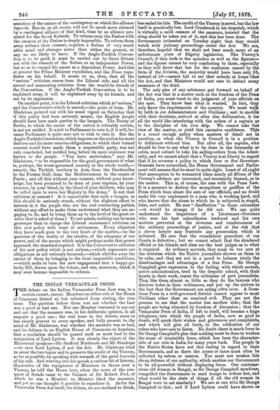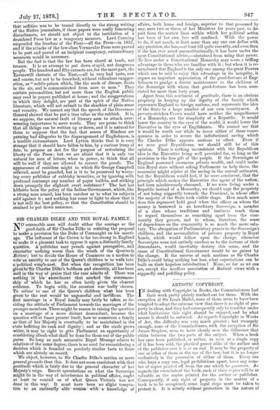THE INDIAN VERNACULAR PRESS. T HE debate on the Indian Vernacular
Press Law was, to a certain extent, unreal. Members on either side of the House of Commons hinted at, but refrained from stating, the true issue. The question before them was not whether the Law was a good or bad one. Not one Member ventured to say out and out that the measure was, in his deliberate opinion, in all respects a good one ; the real issue in the debate, more or less clearly present to every speaker, and fully present to the mind of Mr. Gladstone, was whether the measure was so bad, And its defence in an English House of Commons so hopeless, that a resolution should be passed such as must lead to the resignation of Lord Lytton. It was clearly the object of the Ministerial speakers—Sir Stafford Northeote and Mr. Stanhope —to save Lord Lytton, if not his Act. Mr. Gladstone tried to sever the two topics and to preserve the credit of the Viceroy, so far as possible, by speaking with warmth of the good features of his rule. And weaving into his speech a curious bit of history, illustrative of the repugnance of Ministers to throw over a Viceroy, he told the House how, when the news of the con- quest of Seinde came to the Cabinet of Sir Robert Peel, of which he was a Member, no Minister liked the measure, and yet no one thought it possible to repudiate it. As for the Vernacular Press Act itself, the debate, we are inclined to think, has sealed its fate. The credit of theNieerey is saved, but the law itself-is practically lost. Lord Cranbrook in his despatch, which is virtually a,-mild .ceneure of the .raeasnre, insisted that the sting -should be taken, out of it, and.this has been done. The Government intimated on Tuesday-night that—they would watch with jealousy :proceedings -under the Act. We are, therefore, hopeful that we flail not hear mush more of on unfortunate piece of fidgetty legislation. The Viceroy's Council, if they look, to the speeches as well as the fignres, and the figures cannot be very comforting to them, eepeciatly as they will. know that but for the- confusion caused by .tho form of the division, the majority -would have .been only 38, instead of 56—cannot fail to see that nobody at home like! the Act, and that Ministers would :not care to defend many measures of the kind.
The only plea of any substance ,put forward on behalf -Of the Act was that in a matter such. as the freedom of the Profs of Tndia, you must trust to the .judgment of your officials en the spot. They know best what is wanted. In fact, they only know the requirements of the country. We must walk by faith in our Administrators and Civilians ;, and to meddle with their decisions, arrived at after due deliberation, is for all the world like interfering with the orders of a captain to the discipline of his own ship. We cannot take this view of the matter, or yield this excessive confidence. This is a sound enough _policy when :matters of detail are in question, or when the Viceroy in Council is in a position to deliberate without bias. But after all, the captain, who should be free to say what is to be done in the .forecastleer cabin, must submit to take his sailing-orders from the Admi- ralty, and we cannot admit that a Viceroy isat liberty to expect that if,he reverses, a policy to which four or five Governer- Generals have subscribed, the Home Gmvern,ment and Pnrijs- ment will assume that he must be quite right. Least of all ought that assumption, to be warranted when nearly all fifteen of the Viceroy's advisers are interested, and necessarily biassedves to the matter. Thisis, of course, the ease with the Press Law. It is a measure to destroy -the mosquitoes or gadflies of the Press which buzz ttbont,the ears of our officials and no do4t make life very unpleasant to a man who is working hard, and who knows that the Abuse to which he is subjected, is stupid, false, and unfair. He sees " disaffection" in those calumnies —it would he strange if he did not. We can qnite understand the inipAtience of a Lieutenant- Governor who sees his best subordinates traduced , and his own motives perverted at the slowness and cumbrousness of the ordinary proceedings of justiee, and at the risk that a clever lawyer may frustrate any prosecution which is initiated. He sees that the roundabout procedure of our Courts is defective • but we cannot admit that the slandered official or his friends and .class are the best judges as to what is required. As ordinary mortals, they must be too sere at the criticism which the Native journalists shower on them to be calm, and they are. not in a mood to balance nicely the disadvantages and advantages. of a free Press. Sir George Campbell gave expression to the feeling with which earn*, active Administrators, bred in the despotic school, with their hearts in their..work, resent the criticisms of pert journalists. They like thera,almost as little as they do the lawyers who discover holes in their ordinances, and put up the natives to the feet. that the Government are acting ultra vires. A licen- tious Press in a well-governed district cannot appear to most Civilians ether than an unmixed evil. They, are not, the persons to see that the matter has ,another side ; that the people are being educated by freedom of discussion ; that the Vernacular Press of.India, if left to itself, will become a huge telephone, into which, the people of India, now as good as dumb, will speak their 'wishes and .grievances and ogroplaints, and which will give all forth, to the edification of onr rulers who have ears to listen. No doobt there is much force in Sir George Campbell's plea that nothing must be done to weaken the sense of irresistible force,, which has been the character. istic of our rule, in India for many years back. The people in the Native States have not this feeling in regard to their Governments, and so there the ceases or taxes must often be collected by sabres or cannon. You must not weaken this cheap defence of our.anthority, which enables our Government to be all-powerful without displaying force. One montumn- eioru3 old woman in Bengal, as Sir George Campbell mentions, compelled the government to send troops to reduce her, and what would be the state of things if all the old women in Bengal were to act, similarly? We are atone with Sir Ge9rge Campbell in this ; and if Lord Lytton could have shown us that 'seditiOn 'wee to ' be ' traced directly to the strong writing of the -Native 'journalists, if thee 'papers were really fomenting distiithinias, we - shOuld not object to the institution of a drumhead Press law as a temporary measure. Lord Canning suspended the freedom' of the Press—all the Pietas—in 1857, aid if the' attacks of the lowciass Vernacular Press' were proved td be part and parcelof an incipient 'conspiracy, ettrabrdinary ineasines wduld be necessary. Biit the fact' is that the law has been aimed at trash, not tree:soh: It is an attempt to put down stupid, not dangerous people: The hundred and 'fifty extracts are, for the mOst part, the EatitneVill rhetoric of the East,—all' in 'very bad taste, raw and -Coarse, but notto be described, without ridiculous exagger- atibn, as "subtle poison which, like the seeds Of disease, floats in` the air, and-s communicated froth- man to man." They ediafain personalities; but not more than the English public May'read in papers published at hone; and the exaggerations in'which they delight, are 'part of the 'spirit of the Native literature, -which 'will not submit to the sheekleS of plain sense and Veraeity. We 'cannot 'say that the speech of the Governoi, G-eiterid sh'owe'd that he put; a trite value -on'tlie rubbish. It is, we siippose, the natural fault of literary men to attach over- weening Importance to Mere words: They are prene- to think that all things can -be' written up or down, and it is natural for them to .sueppose that the• fact that score!! of .HindoOs are penning bad' allegories to the disparageinent of Englishmen, is a terrible cileumatanee. Lord Lytton thinks that it is very strange that it: should have fallen Whim; by a curious' irony of fate,- to prtipose an 'Act for the purpose of redrainirig the liberty of the Press; ' but we are afraid that it is only toe natural for Men' of letters, when in power, to think • that all will bewell if they are allowed to correct the proofs. The appearande of resistless might to which Sir George Campbell referred, must be guarded, but is it to be Preteried by'Worry- ing every priblisher of rubbishy invective; or by ignoring with profound cdittempt any inunber of 'paper bullets, and striking dew-1i 'pri:sniptlY the slighted overt resistance! ' The last has hitherto been-the policy of the -Indian Gove'reinent; whieh, like it'atinng 'Man alined; has-been careless as to 'What' its subjects Said 'against it ; and nothing has Come to light td show it is not still the befit POlicy, or that the' ConstititionehOuld be strained te pñt dOwn nonsense.'



































 Previous page
Previous page